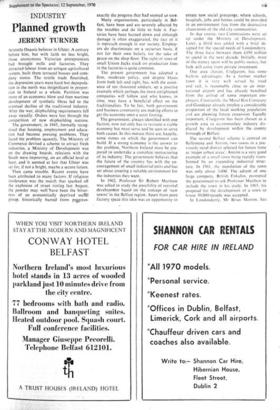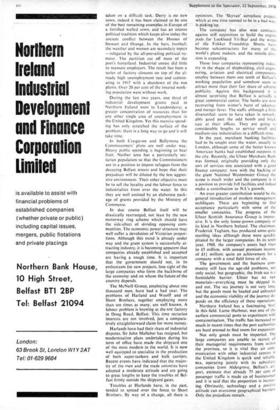INDUSTRY
Planned growth
JEREMY TURNER
Aristotle Onassis believes in Ulster. A century before him, but with faith no less bright, those anonymous Victorian entrepreneurs had brought mills and factories. They attracted labour from an antique agricultural system, built them terraced houses and com- pany stores. The textile trade flourished, the depression years were hard but depopula- tion in the north was insignificant in propor- tion to Ireland as a whole. Partition was more of an economic blow and then wartime development of synthetic fibres led to the eventual decline of the traditional industry. After the war, shipbuilding requirements fell away steadily. Orders were lost through the competition of new shipbuilding nations.
The government, in 1945, formally recog- nised that housing, employment and educa- tion had become pressing problems. They faced the problem squarely. The Ministry of Commerce devised a scheme to attract fresh industries, a Ministry of Development was on the drawing boards, relations with the South were improving, on an official level at least, and it seemed at last that Ulster was set for, if not a bright, maybe a secure future.
Then came trouble. Recent events have been attributed to many factors. If religious intolerance was the match that sparked off the explosion of street rioting last August, the powder may well 'have- been the bitter- ness of an economically deprived socIA1 group, historically barred from pragress-
exactly the progress that had seemed so sure.
Many organisations, particularly in Bel- fast, have been and are severely affected by the troubles and do little to hide it. Fac- tories have been burned down and although damage is often exaggerated, the fact of it is reproach enough in our society. Employ- ers do discriminate on a sectarian basis, if not for their own beliefs, for the sake of peace on the shop floor. The sight of rows of small Union Jacks stuck on production lines in the factories is quite common.
The present government has adopted a firm, moderate policy, and despite blasts from both left and right, has, with the assist- ance of ten thousand soldiers, set a positive example which perhaps the more enlightened companies will follow and who knows, in time, may have a beneficial effect on the traditionalists. To be fair, both government and business community are making efforts to get the economy onto a surer footing.
The government, always identified with one faction, now not only has to recreate a viable economy but must serve and be seen to serve both causes. In this morass there are, happily, some stones on which the government can build. If a strong economy is the answer to the problem, Northern Ireland must be pre- pared to undertake a complete restructuring of its industry. The government believes that the future of the country lies with the en- couragement of small industrial units and has set about creating a suitable environment for the industries they want.
In 1962, Professor Sir Robert Matthew was asked to study the possibility of regional development based on the concept of 'new towns' in the Belfast region. Apart from pure factory space this idea was an opportunity to create new social groupings, where schools, hospitals, jobs and homes could be provided in an environment free from the destructive chauvinism of the old city communities.
In due course, two Commissions were set up under the Ministry of Development. Later, a third was added with a brief de- signed for the special needs of Londonderry. The three have between them £450 million to spend in the next decade. Initially, most of the money spent will be public money, but bulk will come from private investment.
One area chosen, Craigavon, has some built-in advantages. As a former market town it is very well served by road and rail, is reasonably close to an inter- national airport and has already benefited from the arrival of some important em- ployers. Courtaulds. the Metal Box Company and Goodyear already employ a considerable proportion of the local working population and are planning future expansion. Equally important, Craigavon has been chosen as a growth area to accommodate industry dis- placed by development within the county borough of Belfast.
The second Belfast scheme is centred on Ballymena and Antrim, two towns in a pre- viously rural district selected for future fame as 'major urban areas'. Antrim is a very good example of a small town being rapidly trans- formed by an expanding industrial struc- ture. In 1961. the population of the town was only about 3.000. The advent of one large company, British Enkalon. prompted the government to ask Professor Matthew to include the town in his study. In 1965, his proposal for the development of a town to house 30,0009people was accepted.
In Londonderry, Mr Brian Morton. has
taken on a difficult task. Derry is no new town, indeed it has been claimed to be one of the beSt remaining examples in Europe of a fortified walled town, and has an intense political tradition which keeps alive today the ancient conflict between the Houses of -Stewart and Orange. In the bars, football, the weather and women are secondary topics —relegated by the all-prevailing political ru- mour. The partition cut off most of the port's hinterland. Industrial unrest did little to reassure employers. The result has been a series of factory closures on top of the al- ready high unemployment rate and culmin- ating in 1967 with a shutdown of the BSR plants. Over 20 per cent of the insured work- ing population were without work.
During the last two years, one third of industrial development grants paid in Northern Ireland went to Londonderry; a greater concentration of resources than for any other single area of unemployment in the United Kingdom. Yet this massive spend- ing has only scratched the surfa-ce of the problem; there is a long way to go and it will take time.
In both Craigavon and Ballymena the Commissioners' plans are well under way. Heavy public spending is beginning to bear fruit. Neither area has a particularly sec- tarian population so that the Commissioners are in a position to import refugees from the decaying Belfast streets and hope that their prejudices will be diluted by the less aggres- sive environment. Their other objective must be to sell the locality and the labour force to industrialists from over the water. In this they are well assisted by an elaborate pack- age of grants provided by the Ministry of Commerce.
In due course Belfast itself will be drastically rearranged, not least by the new motorway ring scheme which should have the side-eftect of dividing opposing com- munities. The economic power structure may well suffer a devolution of Victorian propor- tions. Although this trend is already under way and the grant system is successfully at- tracting industry, it is becoming apparent that companies already established and accepted are having a rough time. It is important that the government should not, in its enthusiasm for new projects, lose sight of the large companies who form the backbone of the economy and on whom the future of the country depends.
The McNeill Group, employing about one thousand men, have had a bad year. The problems of Harland and Woolff and of Short Brothers, together employing more than ten times as many, are well known. A labour problem is brewing at the src factory in Doag Road, Belfast. This time sectarian interests are not involved, just a compara- tively straightforward claim for more money.
Harlands have had their share of industrial disputes. Sir John Mallabar has resigned, but modernisation plans undertaken during his term of office have made the shipyard one of the most modern in the world. It is now well equipped to specialise in the production of both super-tankers and bulk carriers. Recent events have indicated that the major- ity of the men and the trade unionists have adopted a moderate attitude and are going to great lengths to keep the troubles of Bel- fast firmly outside the shipyard gates.
Troubles at Harlands have, in the past, tended to spread over the fence to Short Brothers. By way of a change, all there is
optimism.. The 'Skyvan' aeroplane project. which at one time seemed to be in a bad way. is picking up.
The company has also won contracts against stiff opposition to build the engine pods for Lockheed Tri-Star and the wings of die Fokker Friendship. Shorts have become subcontractors for many of the world's plane makers. and the missile divi- sion is expanding.
These four companies representing indus- try in the shape of shipbuilding, civil engin- eering, aviation and electrical components employ between them one tenth of Belfast's working population and somehow seem to attract more than their fair share of adverse publicity. Against this background it is almost surprising that Belfast is actually a great commercial centre. The banks are now recovering from winter's burst of takeover and merger fever. The staffs, although a little disgruntled. seem to have taken in remark- ably good part the odd bomb and brick cast at their offices. They are going to considerable lengths to service small and medium-size industrialists in a difficult time.
In the past, merchant banking facilities had to be sought over the water, usually in London, although some of the better known American banks had established outposts in the city. Recently, the Ulster Merchant Bank was formed, originally providing only the sort of services one associated with a good finance company; now with the backing of the giant National Westminster Group the scope is much wider and the company is in a position to provide full facilities and indeed make a contribution to N.I.'s growth.
An even greater contribution would be the general introduction of modern management techniques. These are beginning to find acceptance particularly with some of the smaller companies. The progress of the Ulster Scottish Assurance Group is impres- sive. It is the only home-grown company of its kind in Northern Ireland. The chairman. Frederick Tugham, has produced some quite startling ideas although these were quickly pirated by the larger companies. In its tenth year, 1968, the company's assets had risen to million, with annual premium income of ill million; quite an achievement for a company with a total field force of six.
The government and the business com- munity still face the age-old problems, not only social, but geographic, the Irish sea is a formidable barrier. Ulster has no raw materials—everything must be shipped in. and out. The sea journey is not very long. but the goods must be loaded and unloaded and the economic viability of the journey de- pends on the efficiency of these operations.
Northern Ireland has a fascinating 'first' in this field. Larne Harbour, was one of the earliest commercial ports to experiment with containerisation. The traffic has increased so much in recent times that the port authorities are hard pressed to find room for expansion.
Not only goods must be imported. The large companies are unable to recruit all their managerial requirements from within the province, so it is vital that air com- munication with other industrial centres In the United Kingdom is quick and reliable. sea, operating jointly with its subsidiary companies from Aldergrove, Belfast's air- port, estimate that already 75 per cent of passenger traffic is made up of businessmen and it is said that the proportion is increas- ing. Obviously, technology and a positive attitude can overcome geographical barriers. Only the prejudices remain.















































 Previous page
Previous page